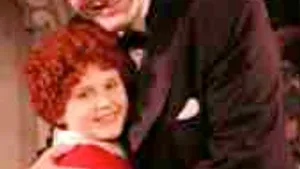Stay in the Loop
BSR publishes on a weekly schedule, with an email newsletter every Wednesday and Thursday morning. There’s no paywall, and subscribing is always free.
We know the Depression's depressing….
"Annie' shows her age

I first saw the original Broadway production of Annie when the show made its way to the Forrest on Walnut Street. It was my first trip to the theater, and I could feel the orchestra's percussion thrumming through me. Every scene and every song seemed thrilling to this novice theatergoer.
So seeing Annie at the Merriam the other day with my two young sons felt especially sweet— to me. But the kids in the theater were less enthusiastic, and I think I know why.
When Annie first hit Broadway in 1977, theater-going parents were just one generation removed from the Great Depression. The musical's Hooverville plot line not only made sense to everyone in the house, it was an homage to Annie's "father," the overtly political cartoonist Harold Gray.
The kids squirmed
But 80 years after the Great Depression, Hoovervilles, and even Franklin D. Roosevelt himself, seem like ancient history, especially to Annie's target audience: kids not yet old enough to vote. Judging from the squirming and murmuring when the title character was offstage, Annie could use some prudent trimming.
The cast of this Annie revival, headed by Madison Kerth in the title role, didn't disappoint. As her diminutive fellow orphan Molly, Mackenzie Aladjem played her scenes big— a delight to watch. The adult ensemble voices in this national touring company sounded Broadway-smooth. David Barton nicely filled the flashy purple suit of Oliver Warbucks. And the camp of Miss Hannigan (Lynn Andrews) and her brother Rooster (Zander Meisner) lit up the dusky Depression-era sets.
But Annie's producers today need a keener a sense of their audience.
Herbert who?
When Disney produced a made-for-TV Annie movie in 1999— with big names like Kathy Bates as Miss Hannigan, Alan Cumming as Rooster, and Audra McDonald as Grace Farrell— the pace was quicker, more appropriate for a pint-sized audience. "We'd Like to Thank You, Herbert Hoover" and a talky scene in the Oval Office where Annie reprises "Tomorrow" were left on the cutting room floor. The NBC radio show where Annie pleads for help to find her parents— a quaint little time capsule, to be sure— was truncated to positive effect.
Come to think of it, John Huston's 1982 screen adaptation of the Broadway original went even further: It eliminated references to the Great Depression altogether.
As Annie ages, its producers and directors should take a lesson from the movies. Children in their Sunday best, holding hands with Mom, Dad and Grandma, come to see the spunky little girl with the adorable dog spin their timeless tale of love and optimism. They've got their own near-depression here and now, which they'd like to escape for a few hours. Like its indefatigable title character, Annie needs to move yesterday into the background and look ahead to tomorrow.♦
To read a response by Dan Rottenberg, click here.
So seeing Annie at the Merriam the other day with my two young sons felt especially sweet— to me. But the kids in the theater were less enthusiastic, and I think I know why.
When Annie first hit Broadway in 1977, theater-going parents were just one generation removed from the Great Depression. The musical's Hooverville plot line not only made sense to everyone in the house, it was an homage to Annie's "father," the overtly political cartoonist Harold Gray.
The kids squirmed
But 80 years after the Great Depression, Hoovervilles, and even Franklin D. Roosevelt himself, seem like ancient history, especially to Annie's target audience: kids not yet old enough to vote. Judging from the squirming and murmuring when the title character was offstage, Annie could use some prudent trimming.
The cast of this Annie revival, headed by Madison Kerth in the title role, didn't disappoint. As her diminutive fellow orphan Molly, Mackenzie Aladjem played her scenes big— a delight to watch. The adult ensemble voices in this national touring company sounded Broadway-smooth. David Barton nicely filled the flashy purple suit of Oliver Warbucks. And the camp of Miss Hannigan (Lynn Andrews) and her brother Rooster (Zander Meisner) lit up the dusky Depression-era sets.
But Annie's producers today need a keener a sense of their audience.
Herbert who?
When Disney produced a made-for-TV Annie movie in 1999— with big names like Kathy Bates as Miss Hannigan, Alan Cumming as Rooster, and Audra McDonald as Grace Farrell— the pace was quicker, more appropriate for a pint-sized audience. "We'd Like to Thank You, Herbert Hoover" and a talky scene in the Oval Office where Annie reprises "Tomorrow" were left on the cutting room floor. The NBC radio show where Annie pleads for help to find her parents— a quaint little time capsule, to be sure— was truncated to positive effect.
Come to think of it, John Huston's 1982 screen adaptation of the Broadway original went even further: It eliminated references to the Great Depression altogether.
As Annie ages, its producers and directors should take a lesson from the movies. Children in their Sunday best, holding hands with Mom, Dad and Grandma, come to see the spunky little girl with the adorable dog spin their timeless tale of love and optimism. They've got their own near-depression here and now, which they'd like to escape for a few hours. Like its indefatigable title character, Annie needs to move yesterday into the background and look ahead to tomorrow.♦
To read a response by Dan Rottenberg, click here.
What, When, Where
Annie. Music by Charles Strouse; lyrics by Martin Charnin; book by Thomas Meehan. 30th anniversary tour, February 26-28, 2010 at Merriam Theatre, 250 S. Broad St. (above Spruce). (215) 732-5997 or 
www.kimmelcenter.org.
Sign up for our newsletter
All of the week's new articles, all in one place. Sign up for the free weekly BSR newsletters, and don't miss a conversation.
